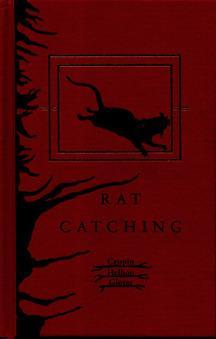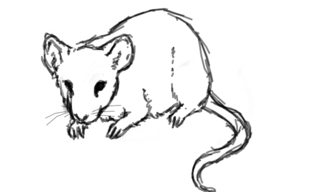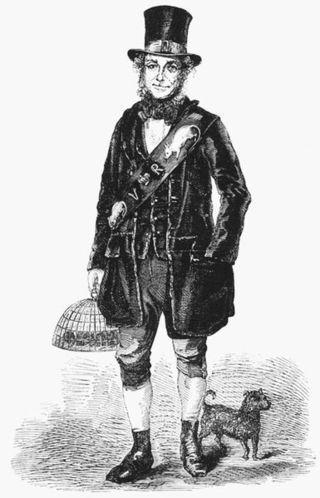
Studies in the Art of Rat-Catching by H.C. Barkley
London: John Murray, Abermarle Street
1896
"My publisher writes to say that he, and he thinks others too, would like
to know how I ever came to write such a book as this! It came about in
this way. Some two years ago, I was about to leave England for a
considerable time, and a few days before starting, I went to stay in a
country house, full of lads and lassies, to say good-bye. One evening,
while sitting over the study fire, the subject of rat-catching came up
and, as the aged are somewhat wont to do, I babbled on about past days
and various rat-catching experiences, till one of the boys exclaimed,
"I say, what sport it would be if they would only teach rat-catching at
school! Wouldn't I just work hard then, that's all!"
Of all the manly arts, I would venture to guess rat-catching has been given the shortest of short-shrift, which is a great pity. If only I'd known sooner a full-length work had been written on this topic how much richer my life would have been. Nay, how much richer all our lives would have been. But now, thanks to Project Gutenberg, a grievous gap in our collective knowledge has been bridged. What was once dark is now illuminated.

RAT
Can you imagine rats hunted for food? I'm from the South and I can't even fathom it.
In the Victorian era, apparently these vermin were considered quite tasty by a certain segment of the population. Jack Black, "Rat-Catcher and Mole-Destroyer to Queen Victoria," described them as positively mouth-watering:
"Moist as rabbits, and quite as nice,” was how he described the rats he cooked for his own consumption. Sewer rats, he insisted, were just as good as barn rats, if you gave them a few days’ chase before killing them."
- Victorian Gothic blog
Mmmm...! Is it lunch time yet?

JACK BLACK, Rat-Catcher and Mole-Destroyer
How the commercial rat-hunting business in London differed from that of the country I'm not certain but, what do you know, our Mr. Barkley wasn't the only person to write books about the sport of champions. A gentleman named Ike Matthews penned Full Revelations of a Professional Rat-catcher After 25 years' Experience in 1898, two years after our Mr. Barkley.
Apparently, he was more of an urban hunter:
"In placing before my readers in the following pages the results of my twenty-five years’ experience of Rat-catching, Ferreting, etc., I may say that I have always done my best to accomplish every task that I have undertaken, and I have in consequence received excellent testimonials from many corporations, railway companies, and merchants. I have not only made it my study to discover the different and the best methods of catching Rats, but I have also taken great interest in watching their ways and habits, and I come to the conclusion that there is no sure way of completely exterminating the Rodents, especially in large towns. If I have in this work referred more particularly to Rat-catching in Manchester that is only because my experience, although extending over a much wider area, has been chiefly in that city, but the methods I describe are equally applicable to all large towns.
Yours truly,
IKE MATTHEWS.
PROFESSIONAL RAT-CATCHER,
PENDLETON,
MANCHESTER."
I'm honestly not sure I can be convinced to read yet another book on rat-catching; from the bit of Mr. Matthews's work I scanned his is the more utilitarian, less entertaining book by far. In short, it's all business and I'm not quite sure I'm up for that, or that I wouldn't worry a little about myself for over compulsion to read two books about catching vermin. At some point you have to ask yourself, is this the person I really want to be? An expert on rat-catching? Could add it to the resumé, I guess.
Mr. Barkley's book has the benefit of occasional hilarity - and I figured out that was on purpose very soon - and it's wonderfully written, a much more personal work. It isn't just about rats and ferrets (rabbits, too, by the way) - though there's an awful lot about that. Other life events, like Barkley and his wife taking in two orphan children after their father - the town loser - was imprisoned, as well as Barkley's dogs and his feelings for animals in general, flesh out the story. So it's more than just the hunting parts - which are no less entertaining, even if ferrets and rats aren't exactly your thing (as, indeed, they aren't mine). But let's have a look at that, as long as it's on the table.
"Respect your parents, respect even their prejudices; gently point out to
your father that you are ambitious and wish for a career in which you
can distinguish yourself. Above all, respect your mother, and show your
respect by not taking ferrets or dead rats in your pockets into her
drawing-room, and by washing your hands a little between fondling them
and cuddling her."
So, how do you capture rats, you ask? It could hardly be simpler in design, though of course every art has its peculiarities that must be learned, preferably from an experienced professional. The basic idea is this: buy good ferrets and good dogs, venture out to the woods and find holes rats have dug into the ground, station the dogs at the further end and insert the ferret into the tunnel. The ferret will chase out the rat, the dog will achieve the kill.
And voilà! You have bagged yourself a rat!
Mr. Barkley did his work with three dogs: Chance, Tinker and Grindum. As for his ferrets, he kept several in a three-part cage and when he needed them he simply reached in and grabbed at random. The poor dears left behind were consoled with a dead rat to snack on.
"First of all, then, the dog's master must understand dog talk; for they do talk, and eloquently too, with their tongues, their ears, their eyes, their legs, their tail, and even with the hairs on their backs; and therefore don't be astonished if you find me saying in the following pages, "Pepper told me this," or "Wasp said so-and-so." Why, I was once told by a bull terrier that a country policeman was a thief, and, "acting on information received," I got the man locked up in prison for three months, and it just served him right. Having learnt dog language, use it to your dog in a reasonable way: talk to him as a friend, tell him the news of the day, of your hopes and fears, your likes and dislikes, but above all use talk always in the place of a whip."
A key requirement is you must keep your ferrets hungry. If they're not hungry they'll have no incentive to lunge into the hole for rats. On the other hand, if they're too hungry the ferret may decide the rat is dinner and forego chasing it to the end of the tunnel - from which no true light shineth.
The balance is delicate; the concept simple.

FERRET
More's the pity, biographical material about author Mr. H.C. Barkley is sparse. Sparse to the point of nearly non-existent. Thus far, the bulk of the material I've been able to glean has been pulled from the text of this great work, extracted in the course of the narrative. While such is certainly better than nothing, still I'd prefer to have a bit more concrete material to work with, aside from the fact the "H" in H.C. stood for Henry and he was a civil engineer.
Also, when he wasn't engineering he wrote a few other books:
Between the Danube and the Black Sea; or, Five Years in Bulgaria
My Boyhood; a Story Book for Boys
A Ride Through Asia Minor and Armenia:...
Bulgaria Before the War
I'd like to read My Boyhood, just to find out more about this mysterious man. Who can be so obscure in the internet age? That takes some doing, when everyone and everything seems to be documented somewhere. And so must he be, in a lost, dusty work no one's gotten around to digitizing yet.
But no doubt his autobiographical work is as entertaining as his rat manual. I'm not quite as keen on Bulgaria, Asia Minor or Armenia, I will admit. But I dug around and found what a free etext of My Boyhood here and I've already been paging through it. Since you twisted my arm, I'll tell you the reason he stated for writing this book:
"As every one knows, we have
had, during the past summer, about four wet
days to one fine one; and this, as my youngsters
know, has kept me much racked with rheumatism,
much in my arm-chair, and very much at their mer-
cy. And as they, poor little mortals, have, from the
first of these evils, been frequently debarred from
their usual excursions to the dogs, etc., they have
devoted their energies to tormenting me, and, on
an average, once in every half hour one or other
of my disturbers has pulled at my hair, coat-sleeve,
table-leg, or book, and begged in a pleading voice
that I would just "'peak about 'Pepper' and
'Wasp,' " which, being interpreted into grown-up
language, means, " go on telling us tales forever..."
This work most contains all the charm that made his rat book so much fun. Though, if this book is as honest and forthright as his work on rats, it would be tough to distinguish fact from fiction. A completely trustworthy autobiography this is not.
Perhaps someone reading this post will send me more information, now or at some future point, about Mr. Barkley. Or, maybe somewhere, someone's digitizing a reference book containing what there is to be known about the man, because there must be something. He didn't just pop up, write a few delightful books, then disappear. Was his work serialized anywhere? Did he write articles or columns or anything that may have appeared in a journal? Are there 19th C civil engineering books that mention him? Anything?
To think I'd have known nothing about him if it hadn't been for the fact I randomly visited Project Gutenberg's home page, looking for something totally unrelated. I saw this new title about rat-catching, and who could resist having a look? Not me, obviously. And it turned into a burning desire (?) to learn more about the 19th Century rat business.
Thank you, Project Gutenberg!

"I once killed a rat inside a church. I found it during a long sermon, but for the life of me I can't remember what that sermon was about. I was sitting in a seat opposite about a score of village school children, and suddenly I was struck by their appearance, and the thought passed through my mind, "How like humans are to dogs! Why, those children look just like my dogs when they find a rat, especially that flaxen-haired girl with a front tooth out." Then I noticed that they were all looking in one direction, and so I looked there too and saw a rat sitting with just its nose out of a hole which ran under the brick floor, apparently listening to the sermon. The next morning the parson and I went to the church. I took one ferret and only Tinker. I chose Tinker because he was black and rather clerical looking. The rat was at home, and we had it in five minutes. This was one of the few times I ever did rat-catching with my hat off, and it felt very queer."

